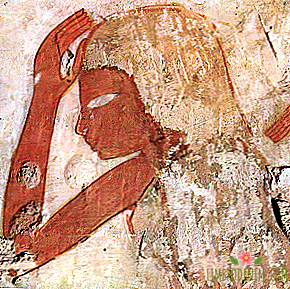Editor Elena Rybakova about favorite books
IN BACKGROUND "BOOK SHELF" we ask heroines about their literary preferences and editions, which occupy an important place in the bookcase. Today the literary critic and editor Elena Rybakova tells about favorite books.

 It is difficult to find something unique in my own reading experience - in childhood and in adolescence it was a common intelligentsia set of late-demanding time, with a scant shelf of children's books, early introduction to the classics and samizdat inserts. Even the shock of the first meeting with “The Magic Mountain” and “The Plague” Camus, then equal to a new birth, now does not seem to me to be something special - who survived, he survived, and knows how it happens.
It is difficult to find something unique in my own reading experience - in childhood and in adolescence it was a common intelligentsia set of late-demanding time, with a scant shelf of children's books, early introduction to the classics and samizdat inserts. Even the shock of the first meeting with “The Magic Mountain” and “The Plague” Camus, then equal to a new birth, now does not seem to me to be something special - who survived, he survived, and knows how it happens.
Special in my case was perhaps that place, which was given to reading in our family. My parents, grandparents and grandparents used to have books where others have real things - talk, affection, belief, spiritual experience that can be put into words. In our family, they were always silent, two generations above me felt themselves to be survived by chance, not completely survived, their dumbness symbolically replaced the death that spared them. Outside of everyday life and anecdotes in our house there were no living words, words for the chief lived only in books; to bring them to the light, to speak out loud and today it seems to me to be a risky task, something a degree higher than usual, for the sake of this self-test of increased risk, I guess that’s what I’m doing.
And one more thing to mention, since we are talking about risk, and in this material I am presented as an editor. There is a writer who always risks more than others and cannot get away from this strange dependence — the writer and his first reader, the one to whom the author is always naked and vulnerable, whom he hates for his own humiliation, let him know that in this couple it is always the first voice. This is more than trust, here, as in love, for both everything is accomplished beyond the limits of the possible, and what binds you now, you can’t put all the drama of your fight in the contract. What can the editor answer to this ultimate trust? If in earnest, nothing, both of you will now live with this experience, and it will be difficult for both of them. Happiness if the writer finds the strength to forgive you for seeing him like this; a disaster if he loses shame; an event, if the ultimate vulnerability of the living turns into the domain of literature.

Cheslav Milos
"Enslaved Mind"
translation of Vladimir Britanishsky
Milosz wrote about the system of compromises to which the writer is doomed, if he wishes to publish under censorship, and rather not for his, but for the western reader, a lengthy essay revealing the very matter of literature. With the coldness of a chemist at the microscope, he shows how the self-censorship mechanism works, how the word does not allow to hide anything, as every writer writes by himself — he can think of everything, but he cannot lie about anything. In my opinion, indispensable, as Lidia Ginzburg's “Notebooks,” is reading for everyone who deals with literature.
Vitold Gombrovich
"A diary"
translation by Yuri Chaynikov
One of the main books written in the twentieth century, and simply one of the main books about meeting with oneself, is beyond national myths, patriotic chatter, the verbal husk of the communities to which you belong, beyond any posture, normative zadannosti, imposed by other people's rules. The literary brawler Gombrovich is difficult to define; Imagine Faust, who moved to the twentieth century, was born in a country with a large national complex (oh yes, the Russian would recognize himself as a Polish tradesman in Gombic, would have had enough courage) and began to experience the universe with his questions - paired with the devil.
Bohumil Hrabal
"Too noisy loneliness"
Inna Bezrukova and others
Desperately unfair that the Hrabal in our country almost do not know, even those who are willing to talk for a long time and with taste about the cinema of Vera Chitilova, as a rule, do not suspect that she has a literary twin. My favorite Grabal is a late absurdist who turns the language inside out, and certainly not only the language of Soviet slogans. The path to this crystal absurdity lay through the hero, so it’s probably better to start with beer stories Dance lessons for the elderly and those who continue and I served the English king with the little Tyrant Schweik, who lived in the Kafkaesky scenery.
Zbignev Herbert
"Barbarian in the garden"
translation by Anatoly Nehaya
In fact, this is a trilogy: a Polish poet, who was in emigration, passes through long halls of museums, through all of antiquity - the Renaissance - New Time and has faithfully documented the journey for compatriots. Everything accomplished is accomplished under the sign of impossibility: they, on the other side of the Iron Curtain, never see these pictures, he, writing, will never be outside the language in the Fatherland, cannot keep up with the brush, the image is powerless before reality - this series of gaps is more than travelog or exhrasis, this is an allegory of love. Needless to say, Eastern Europe has learned to practice such flights - from school exercises to sober talk about the impossible.
Yury Tynyanov
Kühl
I read it for the first time - I swallowed it - “Kühliu”, and then “Death of Wazir-Mukhtar” at the age of ten or eleven, the happiness that it did not occur to me that this was not a child's reading, and no one said it in a special adult voice. A wonderful vaccination against bad literature (after Tynianov you learn to treat the cloying school Aleksin with cold contempt; who among us has not cultivated this contempt since childhood) and the best armor possible: when they will persecute, you know how to look at offenders. As my Kühl for the naughty and smooth Olosinka Ilichevskogo.
Johann Peter Eckerman
"Conversations with Goethe in the last years of his life"
translation by Natalia Man
Another reading, which turned out to be extremely important since childhood; we didn’t have this book at home, we didn’t give it out to the library subscription, and I remember running from school physics to geometry for an hour with it in the reading room. The Ekkermanovsky Goethe, which is open on any page, is an image of normality, that common sense, which returns order to the world, that is why it is so desirable to open it when too much threatens the order in you and around. The figure of Eckermann, the eternal second, Watson to Watson, the worst of the interviewers, is a separate conversation. It opened: "Do not touch Eckermann," said Goethe, "he is not scattered except in the theater."
Graham Swift
"Land of Water"
translation of Vadim Mikhailin
I suspect that it is not quite fair to choose a book for this list not because of its own merits, but only for the sake of conversation, as we could have if our writers had a little less desire to create "great Russian prose" and a little more taste. . Ideal village prose: without the people's sufferings, but with tact, air, space, history and geography, the waters of the English land of Fen, with their rhythm that sets the scale of the fate and pulse of the language - all this is where we have at best the imitation of "Farewell to Mother. "
Gleb Morev
"Dissidents"
The first book about the events and people of that time, which does not leave a feeling of awkwardness, is without this pathetic moth-eaten, which we usually accompany any conversation about the important. I must say, we are surprisingly languageless, we still speak about our past past the day before yesterday with our tongue, is it any wonder that the monsters of this past do not give us peace of mind. Live intonation, three-dimensional figures, passion and pain instead of anti-Soviet common truths - one such book makes for a farewell to the USSR more than a dozen others, agitating for our and your freedom.
Elena Fanaylova
"Lena and the people"
Frankly, I do not know anything more modern than the poetic books of Elena Fanaylova, nothing that would speak with such precision on behalf of the time in which we all ended up. The key word for Fanailova is “everything” - this poetry is so fearlessly democratic, so decisively demolishes the barrier between highbrow and simple ones, flashing our common broadcasting voices of all that its other virtues seem to be derived from this fearlessness. Sibyl, who knows so much about this light that he opens a little - the ancients did not invent anything, it turns out that it is really possible; when you understand that this is so, this knowledge is already irreversible.
Enrique Vila-Matas
"Dublin"
translation by Leah Lubomirska
A novel about today's Blume; like the old Joyce, this Bloom is wrapped in the shell of his own chatter, and the whole book, of course, turns out to be a conversation about words and a sentence to them. This new Bloom is a publisher, a slave of someone else's speech, a supplier of happiness for others, doomed all his life to go through the underwear of literature, to carry the words of others, like his curse, his Molly. Escape to Dublin, to the city, which is all literature, conceived as the perfect suicide; it is hardly surprising that this odyssey will end in salvation — certainly in the salvation of the reader.




